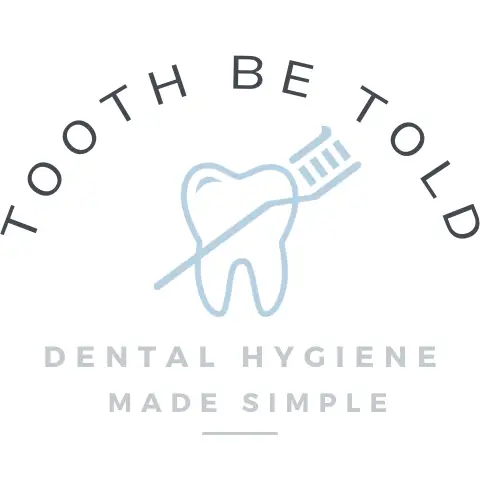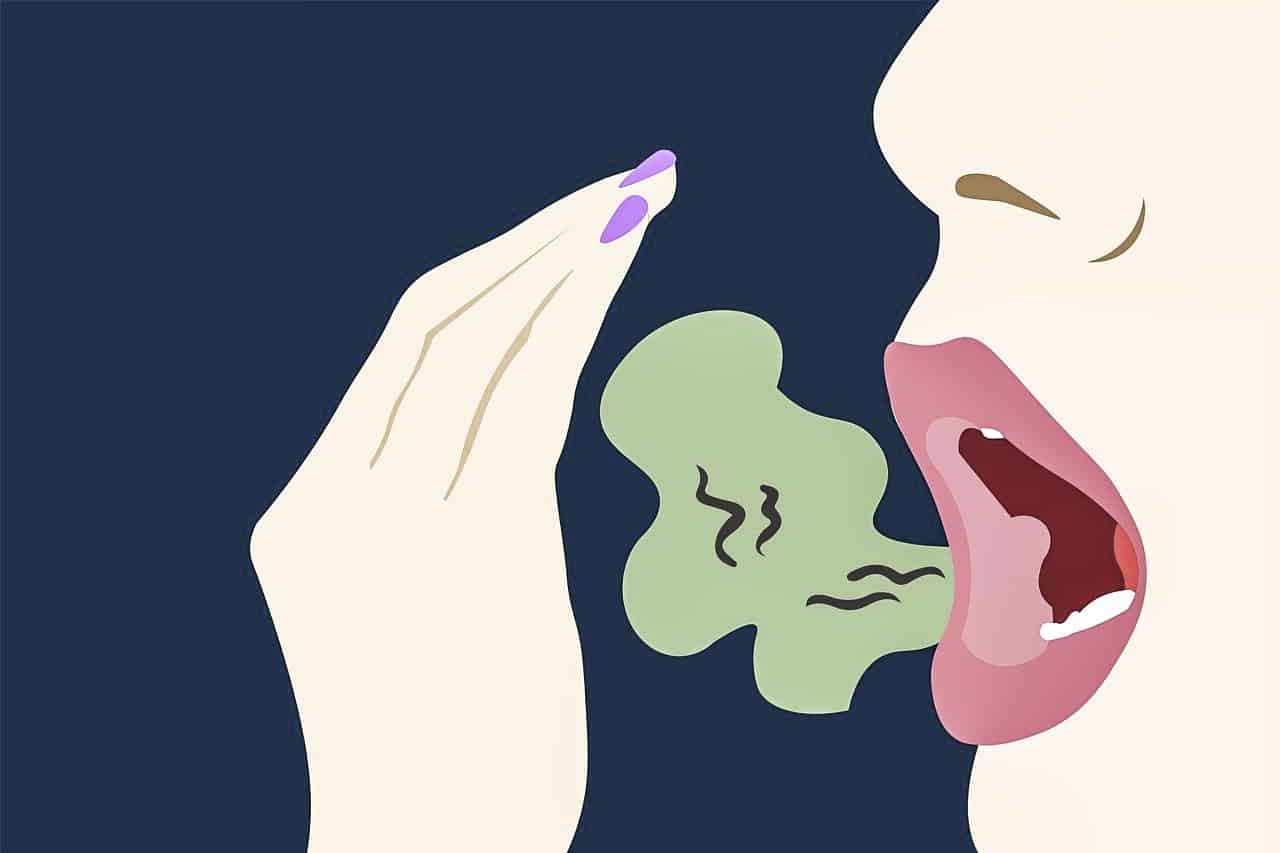
Have you ever been self-conscious of how your breath smells and if other people can smell it too? Many of my patients are bringing up the topic of bad breath. They ask me the signs, causes, and what to do about it because they are embarrassed by their bad breath.
Bad breath is embarrassing. It affects you and everyone around you. Billions are spent each year on products to cover up bad breath, but it needs to be treated from the root of the problem. Gum disease, poor oral hygiene, diet, habits, and medical conditions all impact breath.
Bad breath is a vast industry that not many people even know exists. Mints, gum, mouthwash, toothpaste, and other oral hygiene products are marketed toward bad breath. But no one likes talking about bad breath except us dental professionals!
Who wants to be told that their breath stinks? I know I don’t. In this post, I go over the signs that you have bad breath, its causes, and what to do about it!
The Smelly Truth: How to Know if You Have Bad Breath
Pay attention to the people in our social bubble. Do people step back from you when you are talking?
If you notice when you are speaking to people, if they step back or not (but you may just be invading their personal space… you know, those talkers that get SUPER close to you while engaging in conversation, don’t be that person).
But if people are stepping back from you from an already normal distance, it may be a sign you have bad breath.
Another way to see if you have bad breath;
Smell your own breath.
A few ways to smell your own breath is to lick something, let it dry, and then smell it!
You can lick the back of a spoon and let it dry, and smell it.
You can lick the inside of your wrist and smell it (although not very hygienic).
You can also cup your hands over your nose and mouth and breath out of your mouth heavily, and then quickly breathe through your nose to smell your breath.
And probably the most effective way to see if you have bad breath is to ask someone to smell it! I know this can be embarrassing, but ask someone you know who will be honest with you.
Causes of bad breath
Dry mouth
Saliva plays an important role in maintaining good oral health. The saliva helps to rinse away bacteria and break down food and drink, and it also contains minerals that help to keep the teeth strong.
When saliva is reduced, less food debris gets rinsed away and the bacteria in the mouth start to multiply and grow more.
If you want to know why saliva is so important and all the things that having a dry mouth can cause (not just dry mouth), click the link below and scroll down to the “Why saliva is so important” heading
Read now: Dry Mouth With CPAP: Prevent and Eliminate Dental Problems
Can medications cause bad breath?
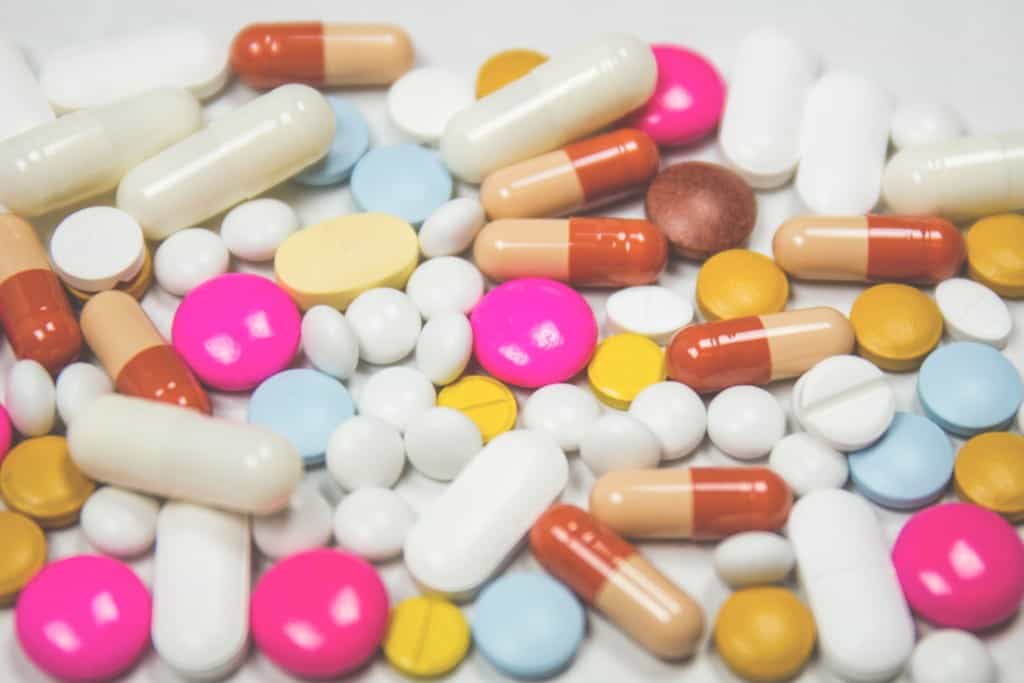
Over 500 medications cause dry mouth and therefore contribute to bad breath. The medications more likely to cause dry mouth are anti-depressants, allergy medications, diuretics and sedatives. Some medications cause bad breath when they break down in the stomach/body.
If you want to learn more about bad breath related to the breakdown of drugs/medications, you can find it in this literary review !
!
Cancer/tumour treatments
Again, this relates to the dry mouth effects of cancer and tumour treatments. If the mass is located in the head and neck region and needs radiation therapy, some of the tissues in the mouth can be affected, and salivary glands may be damaged (causing dry mouth).
Medical conditions such as Sjogren’s Syndrome can cause bad breath
Sjogren’s syndrome causes major dry mouth. My grandmother had Sjogren’s syndrome, and I remember some of the common issues that came along with it.
Due to her lack of saliva, she had some issues with eating and swallowing and needed a drink of water with every meal to help wash away the food particles. That drink was a replacement for the lack of saliva and contributed to better oral health.
Lack of saliva can also contribute to gum disease, oral thrush (oral yeast infection), and increased incidence of decay.
Ill-fitting restorations
If there is a crown, filling, or any other restoration, such as inlays, onlays, veneers and bridges, that are not properly installed/made, it can cause bad breath
This is because if they are not done correctly, there could be larger edges that are not smooth that will trap food or not a good fit with the teeth beside it, causing a food trap. It will be harder to clean and could cause localized gum disease around the area. All of these things could cause bad breath.
Read now: Cleaning Under Your Dental Bridge Made Easy: With Pictures
How poor oral hygiene affects breath
This has to be a given, and I’m not going to spend a long time explaining it! LOL
But when you do not clean your mouth properly and regularly, everything you eat will start to rot and decompose, and the mouth’s bacteria will start to feed on it and produce acid.
Trust me… when food isn’t removed from the mouth well and timely, it does not smell good.
Over time if this cycle continues, gum disease will occur, and that comes along with its own very distinctive smell. As gum disease progresses, teeth will become loose and eventually fall out… not to scare you or anything.
Can loose teeth cause breath to worsen?
Loose teeth can contribute to bad breath for a multitude of reasons. Between gum disease and trauma and a few other reasons, you can find them in the post linked below.
Read now: Stinky Breath From a Loose Tooth? Causes and Treatment
Contributing medical conditions to bad breath
Uncontrolled diabetes can cause sweet breath. Someone who has diabetes may have a fruity-smelling breath due to the increased levels of ketones. If left untreated, DKA (diabetic ketoacidosis) can occur, which is much more serious.
If you think you have this fruit-smelling breath, it is important to discuss it with your doctor and dental professional.
Diabetes is also linked to gum disease; my patients usually come more often for cleaning when they have diabetes.
Bad breath caused by oral piercings
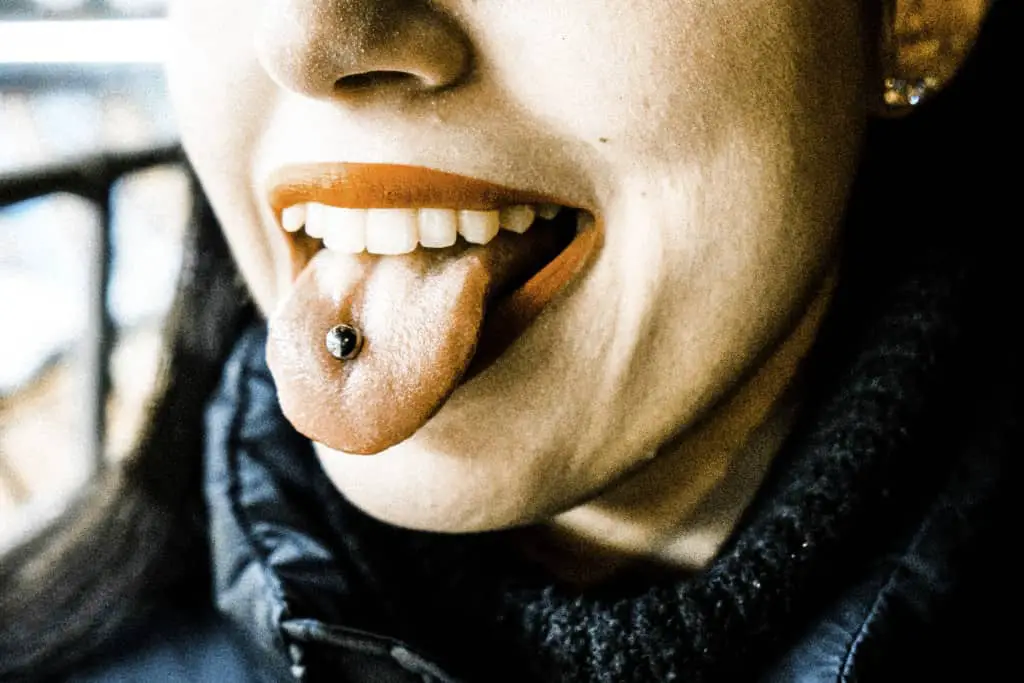
Oral piercings are hard to keep clean and attract bacteria. Food debris gets caught around them, and tartar (calculus) can form around it. All of these will contribute to bad breath.
Oral piercings not only cause bad breath but can cause harm to both the gums and teeth. You can find out all the reasons in the post linked below. 🙂
Read now: 16 Most Common Risks of Oral Piercings You Need to Know Now
Oral habits such as smoking (tobacco and cannabis) and bad breath
Smoking causes bad breath as the substance you are smoking has a smell to it but also because it dries out the mouth. As previously noted in this post, a dry mouth can lead to bad breath. Also, smoking can increase gum disease, which causes bad breath.
Food, drink and specific diet plans can cause bad breath
It’s pretty common knowledge that garlic, onions and coffee cause bad breath. But did you know that other foods can make your breath stink? Fish and dairy products can cause bad breath as the bacteria in our mouths break them down.
Acidic and sugary foods (including fruit) can promote an environment where the bacteria in the mouth will thrive.
Sticky pasty foods such as peanut butter can also contribute to bad breath. Peanut butter (and other nut butter) is oily and makes it hard to break down. Because it is hard to break down, it will last longer in the mouth.
Diet plans and specific dietary allowances, such as keto and Atkins, can cause ketosis breath. This occurs because these specific diets cause the body to enter into a state of ketosis. Some people can describe it as a metallic taste in the mouth, a fruity-smelling breath and even a smell that is similar to nail polish remover.
Read Now: The Lowdown on Keto Breath: A Dental Hygienist Weighs In
Those who consume a high-protein diet can also have their breath affected. The breakdown of protein in our bodies produces ammonia, which can come out of the mouth as a bad smell.
It usually goes undetected and is a vital part of our metabolism, but it is more noticeable when we consume more protein.
Tonsil stones causing bad breath
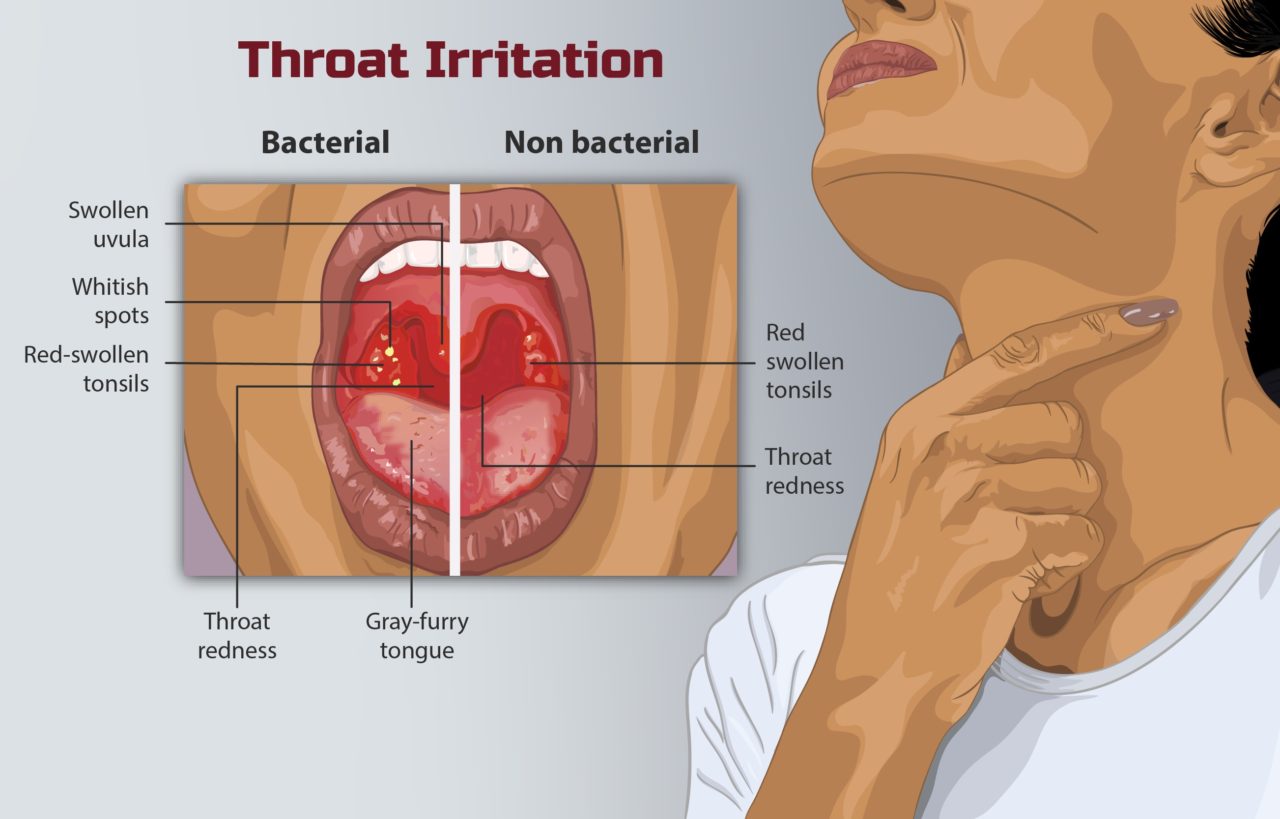
Tonsil stones occur more frequently in people who have cryptic tonsils. Cryptic tonsils can occur if someone experiences strep throat often, and it leaves depressions in the tonsils where food debris and bacteria get caught and form hard white/yellow masses.
Read Now: Can Tonsil Stones Give You Bad Breath? Causes and What to Do!
These masses have quite the smell to them, and they can contribute to bad breath.
How infections in the mouth cause bad breath
Infections in the mouth can go from bad to worse extremely quickly. There are SO many bacteria in the mouth (over 500 different species, to be exact!), and it is the optimal place for bacterial growth. Mix in the food and drink we consume, and the bacteria will have a field day!
Infections in the mouth can cause tissue destruction and decay, which will conjure up quite an odour.
But bad breath can also come from infections present in the nose, throat and sinuses. If you believe that you have an infection, you should seek medical attention. You should see your medical doctor, as well as your dental professional.
Oral surgery wounds and their contribution to bad breath
Having oral surgery can affect your breath in a few ways. It will cause inflammation, and depending on the type of oral surgery that you had, some tissue may decay and break down, resulting in bad breath.
Because of the inflammation, the range of motion of your jaw may be affected, and you may have limited opening of your mouth. This can make flossing and brushing difficult or not possible at all in certain areas of the mouth. You will have an overgrowth of bacteria, and trapped food debris, resulting in bad breath.
Again, depending on the type of surgery and the location, your dental professional may have told you to avoid the surgical site. This can allow some foods to get stuck in the area, contributing to bad breath.
What dental hygienists recommend to do about your bad breath
The first thing I recommend is seeing a dental professional. A thorough assessment of your mouth is the only way to see the whole picture and get to why you have bad breath.
At the dental office, they will assess the tissues and examine the teeth and gum health. In the link posted below, I go through a full dental hygiene appointment and what really goes on.
Read now: How Dental Hygienists Clean Your Teeth
Areas that will be catching food and aren’t cleaned properly are one of the reasons for bad breath. When food becomes trapped and hard to remove, it will start to break down and rot/decompose, which will contribute to bad breath.
Another reason for bad breath is your tongue
Imagine a shaggy carpet.
Read now: Should You Brush or Scrape Your Tongue? Which is better?
What you can do to treat and eliminate bad breath
Don’t just cover it up. You need to treat the cause of the problem, and once you have it under control (which is completely possible), you will have less bad breath or none at all.
- drink water
- rinse your mouth out with water after eating certain foods
- floss your teeth at least 3-4 times a week
- brush twice a day
- have regular dental hygiene appointments
- clean your tongue
Things that people do to improve bad breath that DO NOT WORK
Why mouthwash does not help get rid of bad breath
Mouthwash and mouth rinses have an incredible amount of marketing genius’ behind the products to make people think they are doing a good thing by using them.
This may surprise you, a dental professional telling you to ditch the mouthwash, but I’ll tell you, I will never use mouthwash regularly ever again. Most of the problems associated with bad breath come from much more complex issues.
For example, If there was a massive pile of rotting garbage in the middle of your room, would spraying it with a disinfectant/nice smelling air freshener do the trick and get rid of the smell?
The answer is NO.
The only thing that will get rid of the smell is to remove the garbage and clean up to remove the source of the smell.
This is the exact same for your mouth. Just because you rinse with something does not mean it will get rid of your bad breath.
Why gum does not help get rid of bad breath
This is the same as mouthwash, you are only covering up the problem.
A lot of gums will contain sugar that will be fuel to the fire of bad breath. The bacteria in the mouth will feed on the sugar and produce acid that will break down the tooth surface and increase the number of bacteria in the mouth.
However, the only gum I recommend to people is one that contains xylitol. Xylitol is a naturally occurring sugar alcohol that actually prevents cavities by inhibiting the growth of cavity-causing bacteria (streptococcus mutans)
You can find this gum linked here: Dry Mouth Dental Must-Haves, and scroll down to the Xylitol section.
I hope that this post has helped you!
Have a great day,
Holly 🙂
